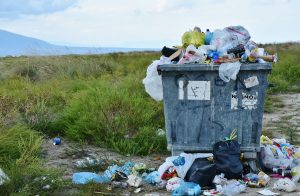Last week, Beijing unveiled an ambitious plan to reduce the country’s single-use plastics. Non-biodegradable plastic bags will be banned in major cities, such as Beijing and Shanghai, by the end of 2020, and across all cities and towns by 2022. Exceptions will be made, however, for markets selling fresh produce. The catering and restaurant industry will be forced to reduce single-use plastics by 30 percent, including a ban on plastic utensils and non-biodegradable straws by the end of 2020. Separately, within five years, the hotel industry must stop offering single-use plastic items and the postal service must end the use of plastic packaging. The crackdown on plastic use and production in China incorporates timelines for various products to be phased out by the middle of the decade, first in major cities, followed by all other cities and towns, as well as rural areas. The reforms were announced by the National Development and Reform Commission, an agency overseen by the State Council responsible for economic planning and administration, and the Ministry of Ecology and Environment.
China has become not only a top producer of plastic, accounting for 29 percent of global production, but also a consumer. Plastics are used across industries in China, including agriculture, cars, construction, durable goods, and industrial packaging, as well as in daily residential life (e.g. plastic shopping bags, water bottles, disposable cutlery, courier bags). But large-scale pollution, and plastics in particular, has been an increasing drag on the country. Our World in Data from the University of Oxford estimates that China was the top producer of plastic waste in 2010, generating 60 million tons, followed by the United States at 38 million, Germany at 14.5 million, and Brazil at 12 million tons.
In addition to this new crackdown, China has instituted other programs and policies to promote sustainability and reduce pollution. The central government laid out plans aiming to increase recycling to 35 percent of waste by 2020 in nearly 50 major urban centers. For example, Shanghai piloted a new recycling system in summer 2019. The new scheme introduced four categories for sorting garbage: 1) recyclables (e.g. paper, plastics, glass, scrap metal, fabric); 2) toxic/hazardous (e.g. batteries, light bulbs, medicine, paint); 3) perishable (e.g. food waste); and 4) dry waste (a residual category). China’s financial hub was the first major city in China to adopt mandatory waste sorting. In a bid to boost compliance, Shanghai listed fines of up to $14,500 for business and government organizations who violate certain recycling rules. While no fines have been articulated for individuals, surveillance cameras are set up for monitoring purposes. Municipal authorities in China’s capital, Beijing, have since amended the city’s laws pertaining to waste disposal with provisions that are expected to come into effect in early 2020.
China has also banned the import of foreign “recyclable” trash, prohibiting a list of two dozen kinds of solid waste, including nonindustrial plastics, paper, and textiles. Before the ban came into effect in January 2018, China and other East Asian countries were the leading destinations of exported plastic waste from higher-income countries, notably the United States and Western Europe. China’s ban has had a profound impact on recycling and waste management systems worldwide and led other Asian countries to institute their own limits.
Despite Xi Jinping’s stated commitment to combat pollution, China’s overall environmental record is checkered. There are, however, significant incentives for China to address climate and environmental issues. Domestically, environmental issues and pollution remain top drivers of protest across the country. Internationally, China, often seen as unwilling to take a leadership position on transnational issues, instead preferring the role of participant or even free-rider, could shed this reticence and push other countries to make bolder national commitments. Moreover, as Deborah Lehr argued in The Diplomat, acting as a “torchbearer” to develop a low-carbon economy is also in China’s interest as it seeks to find new sources of economic development and sustainable growth.
Currently, China is paralyzed by the spreading Wuhan coronavirus, an outbreak that has undoubtedly distracted attention from the government’s plastic policy announcement, which came ahead of Chinese New Year celebrations. Still, the plastic crackdown will have a profound impact on China’s economy. The true test will be how the plastic ban is implemented. Will Chinese businesses be compliant? And if not, what types of incentives or costs might Beijing be willing to levy to ensure enforcement?

































